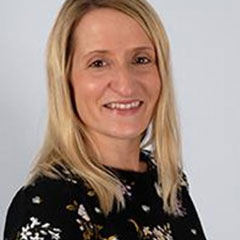Lisa Henderson, Head of Department, Psychology
Lisa joined the University of York as a PhD student in 2006 and I never left! She became a Lecturer in 2012 and in 2023 became Head of Department.

Lisa is a developmental cognitive neuroscientist, with a focus on understanding how sleep contributes to the typical and atypical development of language and mental health.
In 2022, she was the recipient of the British Psychological Society Margaret Donaldson Award, for her contributions to developmental psychology.
email: lisa-marie.henderson
Our 60-second interview with Lisa:
Could you please tell us what work you do in the field of mental health?
I use experimental, neuroscientific, and large-scale longitudinal methods to understand how sleep supports different aspects of development from infancy through to adolescence. My work in this area started with a focus on the mechanisms by which sleep supports language development through promoting the formation of long-term memories of newly-learned language and how this can go awry in children with sleep difficulties (e.g., autism spectrum disorder). More recently I have been more focused on understanding how sleep difficulties can contribute to the onset of mental health difficulties in adolescence and what we can do to mitigate this.
What do you find most rewarding and inspiring in this work?
The fantastic array of collaborators that I have been fortunate to learn from. This includes collaborators within my own discipline and outside (e.g., Environment, Health Sciences, Philosophy, Art, Computer Science, Engineering, Linguistics, Education) as well as with educational and clinical practitioners, health workers and families. These collaborations are not only incredibly rewarding and valuable for me personally, but owing to the far reaching effects and complexity of sleep and the ultimate goal of delivering real-world impact, they are also critical.
What is the most challenging or complicated aspect of this work?
Many of the state-of-the-art methods that we use to measure sleep are often not suitable for large-scale research. A key and current goal for our lab is to develop scalable measures that can be applied to larger-scale longitudinal and intervention based research.
What impact do you hope your work is having - or can potentially have?
I have spent a number of years developing a strong theoretical foundation in my research, which I am now beginning to translate through to influencing policy and developing interventions. For example, I work closely with The Sleep Charity to influence policy and education around early years sleep, and I am developing and testing apps to modify sleep in adolescence. We have strong evidence that sleep should sit alongside the likes of diet and exercise as a key and modifiable variable that can have both direct and indirect effects on health.
Could you share with us one piece of advice that you follow for your own mental health?
Putting time aside each day for self care. For me, that’s doing exercise and playing the piano.